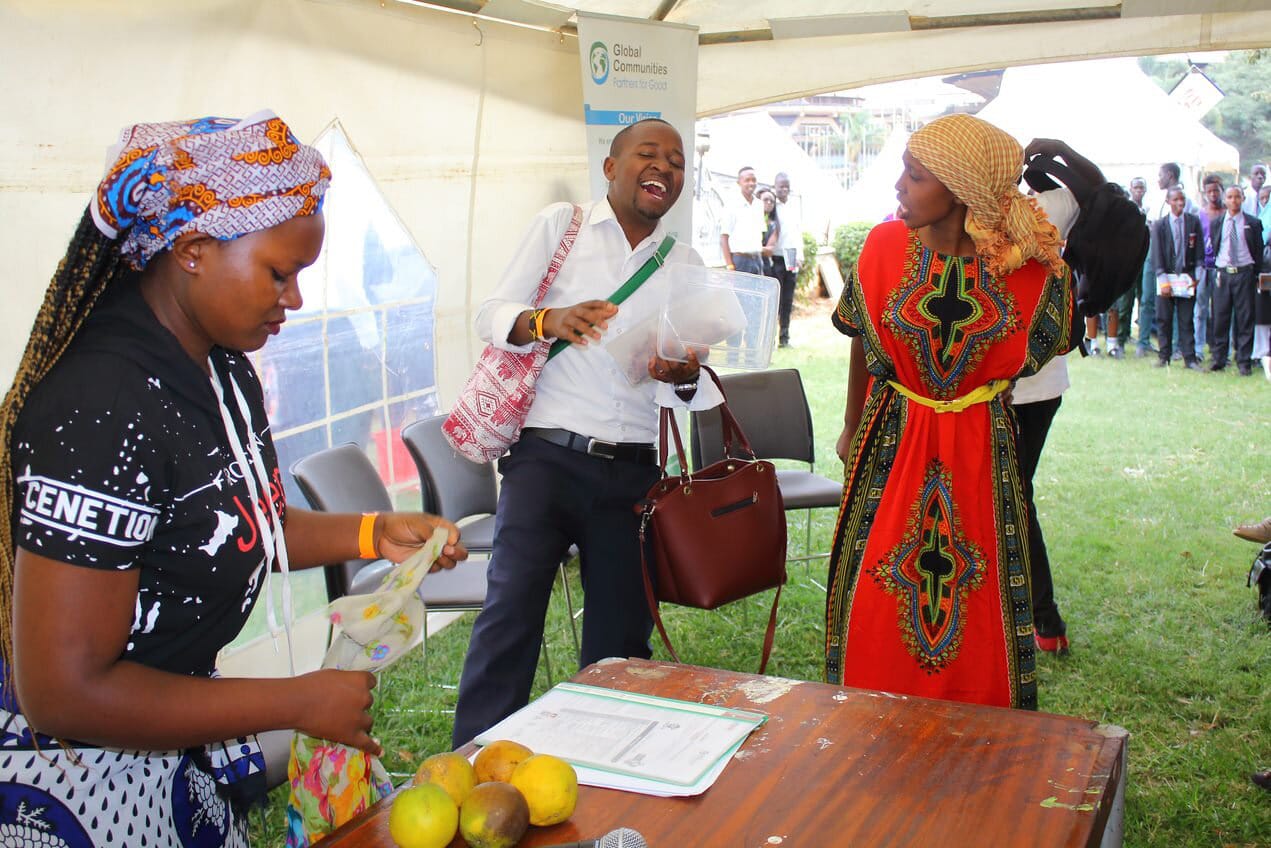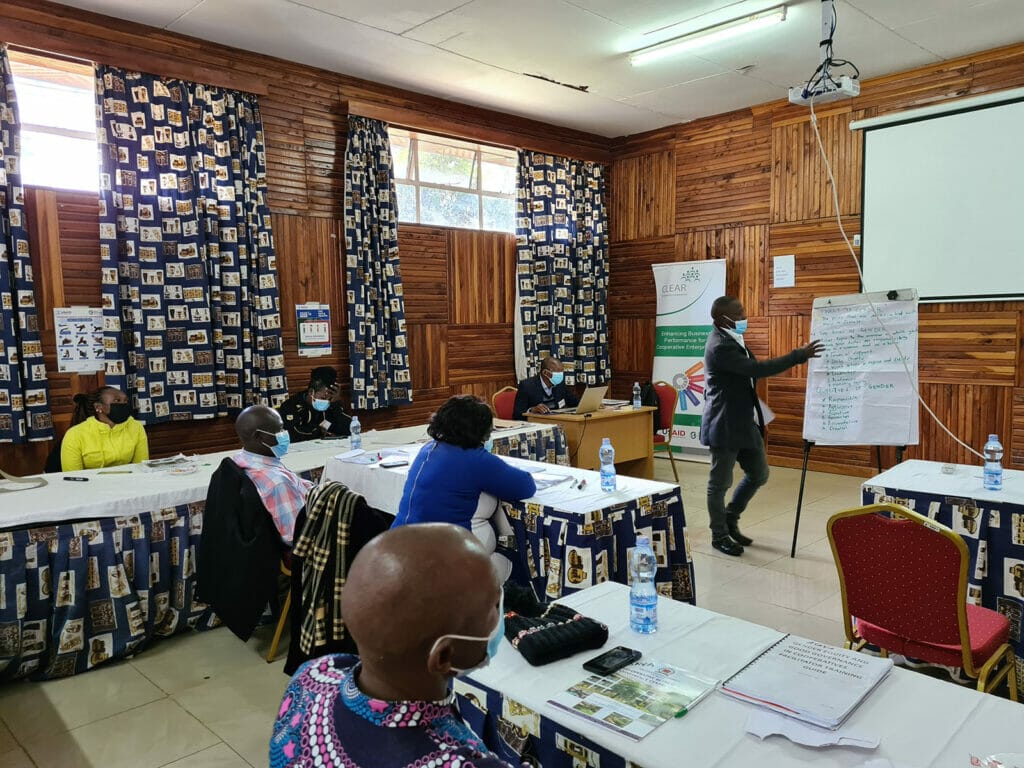News > Blog
Chipukizi Voice of Drama: A Kenya Case Study
Published 01/31/2022 by Global Communities

U.S. Agency for International Development (USAID) Cooperative Development Program – Cooperative Leadership, Engagement, Advocacy & Research (CLEAR)
Youth employment is not a laughing matter – unless you are a member of Chipukizi Voice of Drama.
What began as a small club has since grown into a business led by young people who helped pioneer the worker-owned cooperative model in Kenya.
Chipukizi (“Sprout” in Swahili) was started by a group of students from the Co-operative University of Kenya who had a passion to perform and use their gifts in drama, dance and song. At first, members struggled to find gigs, mostly booking events and ceremonies organized by the university. When they did perform, they barely made a buck. Nevertheless, the group saw potential in what they were doing and wanted to draw attention to issues such as unemployment, crime and social injustice through their work. They believed in the role of performing arts in driving culture and societal norms, along with economies.
According to a report by Ameco Research, the entertainment and media revenue in Kenya is expected to grow to $2.96 billion in 2023. Likewise, the global entertainment and media market is expected to reach more than $6 trillion by 2030.
EARNING THE SPOTLIGHT
After Chipukizi registered as a performing arts worker-owned cooperative in 2019, the larger community became more interested in what the group had to offer. Now, their scope of work extends beyond the university, with new clients hiring them to enliven conferences with their skits. Members write screenplays and collectively decide which ones they will perform. It’s also profitable. The cooperative earns revenue, primarily from ticket and concession sales, memberships and sponsorships, which sustain ongoing operations.
No longer an informal youth club, Chipukizi has grown to include university alumni in addition to current students, with a total of 30 members between 18 and 30 years old. The cooperative is also exploring the idea of allowing those who are not affiliated with the university to join, which would increase their size, talent pool and income. These changes and new performance opportunities have garnered local media attention for the cooperative as “a social model for youth.”
2019
became a registered cooperative
30
members
21
average member age
46%
women members
UNDERSTANDING THE BUSINESS OF COOPERATIVES
Initially, a lack of recognition and information on worker cooperatives in Kenya posed a challenge for Chipukizi during their transition from a youth club. However, members remained focused on building a unique cooperative that showcased their collective skills and services. Worker cooperatives provide a democratic governance structure of member-worker-owners, where decisions are made by those directly involved in the enterprise, with increased flexibility and collaboration among workers.
Due to the changing needs of work, worker cooperatives provide an important organization model that can be adopted by youth who face unemployment despite their rich education and skills. Still, as a relatively new model, there can be a steep learning curve. With guidance and technical support from the Co-operative University of Kenya and Global Communities, Chipukizi has transformed into a sustainable business as inaugural participants of the U.S. Agency for International Development’s Cooperative Development Program – CLEAR.
In addition to learning how to maintain accurate financial records, members now know more about their rights as vested members of the cooperative as well. They are currently in the process of developing good governance and management structures. Since incorporating in 2019, Chipukizi has established seven committees made up of nominated members who have a range of skills and interests. The cooperative is also establishing a board that will play a hands-on role and lead operations, focusing on long-term sustainability.
To date, Chipukizi has no employees and depends on the volunteerism of its members to handle day-to-day operations, which are dynamic and include a wide rage of tasks, from training non-members and participating in various capacity building activities to advertising on social media and booking events. These activities are managed by committee leads, most of whom are alumni of the university and have more time to dedicate to the cooperative. Each alumnus contributes about 10-15 hours of volunteer time per week.
“Sometimes it takes a long time for decisions to be made since it is a collective process, and some members become non-responsive to issues. The cooperative is working to ensure full participation by all members.”
Ali Njenga, board member
EXPLORING NEW MODELS FOR GROWTH
Internet user growth in Kenya has provided an opportunity for Chipukizi to diversify its audience and expand to digital consumers. The cooperative now markets their content, which is driving more people to their social media pages. This transition was especially important at the onset of the pandemic when conferences and in-person events came to a halt. The group even created several videos on COVID-19 safety measures and best practices to help curb the spread.
Aside from exploring more opportunities in the digital realm, Chipukizi is also focused on growing their own talent. Each member pays a one-off fee of $10. Students who are interested in performing are taken in by the cooperative as attachés and trained by existing members with select opportunities to perform. This mentorship helps grow Chipukizi’s membership while also teaching employable skills to local young people. The cooperative is committed to inclusive growth as well. Women are treated equally and given an opportunity to voice their opinions and ideas during meetings. Most of the committees, including welfare and marketing, are led by women.

CONNECTING WITH THE COMMUNITY
Chipukizi members have demonstrated that the cooperative benefits the community as a whole. Through their compelling performances, they have been able to sensitize youth against crime and advocate for greater youth participation in cooperatives. Chipukizi is also working towards building and strengthening partnerships with other local schools. The objective is to develop a regular schedule of events and performances that create opportunities for students to learn and promote the arts and cooperative model.
As a start-up worker cooperative, Chipukizi has been able to gather many lessons that will prepare them for future growth and success. They have learned that they must scale up and diversify their revenue streams to meet the cooperative’s growing needs and that community engagement is critical, particularly through volunteer opportunities and partnerships. They also recognize the need to explore strategies that will help them retain and nurture performing arts members. The more that Chipukizi is able to increase personal connections between community members and the cooperative, the more the youth-focused business will have staying power for generations of performers (and consumers) to come.
Chipukizi Voice of Drama Cooperative, Fidel Wambiya, Tindi Sitati, Diana Macharia and Mike Kipngeno contributed to this case study. Download a copy here.

This case study is made possible by the generous support of the American people through the United States Agency for International Development (USAID). The contents are the responsibility of Global Communities and do not necessarily reflect the views of USAID or the United States Government.





